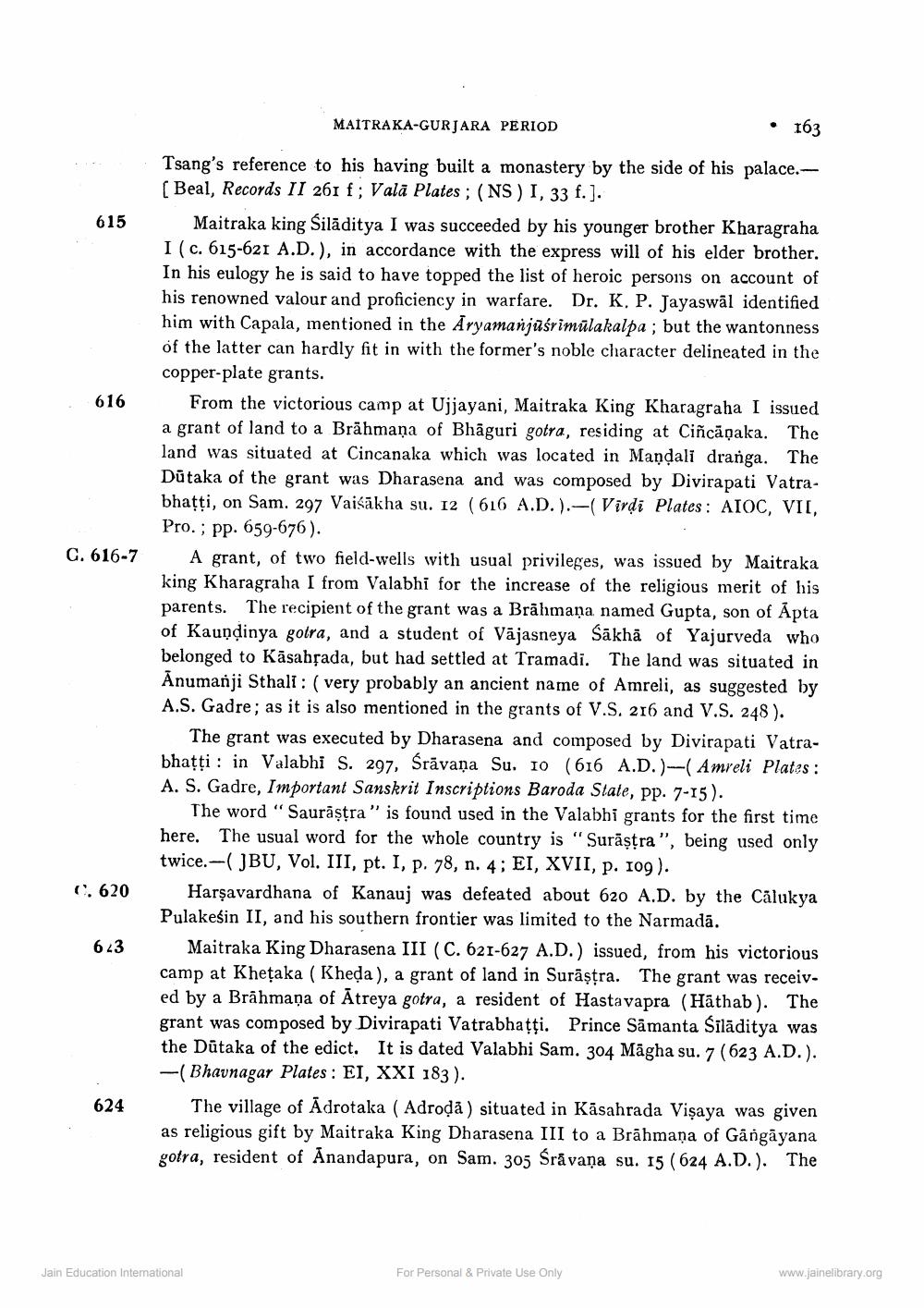________________
MAITRAKA-GURJARA PERIOD
• 163
615
616
C. 616-7
Tsang's reference to his having built a monastery by the side of his palace.(Beal, Records II 261 f; Valā Plates ; (NS) I, 33 f.].
Maitraka king Silāditya I was succeeded by his younger brother Kharagraha I (c. 615-621 A.D.), in accordance with the express will of his elder brother. In his eulogy he is said to have topped the list of heroic persons on account of his renowned valour and proficiency in warfare. Dr. K. P. Jayaswal identified him with Capala, mentioned in the Aryamanjūśrimülakalpa ; but the wantonness of the latter can hardly fit in with the former's noble character delineated in the copper-plate grants.
From the victorious camp at Ujjayani, Maitraka King Kharagraha I issued a grant of land to a Brāhmaṇa of Bhāguri gotra, residing at Ciñcāņaka. The land was situated at Cincanaka which was located in Mandali dranga. The Dūtaka of the grant was Dharasena and was composed by Divirapati Vatrabhatti, on Sam. 297 Vaišākha su. 12 (616 A.D.).-(Virdi Plates: AIOC, VII, Pro.; pp. 659-676).
A grant, of two field-wells with usual privileges, was issued by Maitraka king Kharagraha I from Valabhi for the increase of the religious merit of his parents. The recipient of the grant was a Brāhmaṇa named Gupta, son of Apta of Kaundinya gotra, and a student of Vājasneya Sākhā of Yajurveda who belonged to Kāsahşada, but had settled at Tramadi. The land was situated in Anumanji Sthali : ( very probably an ancient name of Amreli, as suggested by A.S. Gadre; as it is also mentioned in the grants of V.S. 216 and V.S. 248).
The grant was executed by Dharasena and composed by Divirapati Vatrabhațți : in Valabhi S. 297, Srāvana Su. 10 (616 A.D.)-(Amreli Plates : A. S. Gadre, Important Sanskrit Inscriptions Baroda State, pp. 7-15).
The word "Saurāṣtra" is found used in the Valabhi grants for the first time here. The usual word for the whole country is "Surāṣtra", being used only twice.-( JBU, Vol. III, pt. I, p. 78, n. 4; EI, XVII, p. 109).
Harşavardhana of Kanauj was defeated about 620 A.D. by the Cālukya Pulakesin II, and his southern frontier was limited to the Narmadā.
Maitraka King Dharasena III (C. 621-627 A.D.) issued, from his victorious camp at Khetaka ( Kheda), a grant of land in Surāşțra. The grant was receiv. ed by a Brāhmaṇa of Atreya gotra, a resident of Hastavapra (Hāthab). The grant was composed by Divirapati Vatrabhațţi. Prince Samanta Sīlāditya was the Dūtaka of the edict. It is dated Valabhi Sam. 304 Māgha su. 7 (623 A.D.). -(Bhavnagar Plates : EI, XXI 183).
The village of Ādrotaka ( Adroda ) situated in Kāsahrada Vişaya was given as religious gift by Maitraka King Dharasena III to a Brāhmaṇa of Gängāyana gotra, resident of Anandapura, on Sam. 305 Srāvana su. 15 (624 A.D.). The
C. 620
623
624
Jain Education Interational
For Personal & Private Use Only
www.jainelibrary.org




